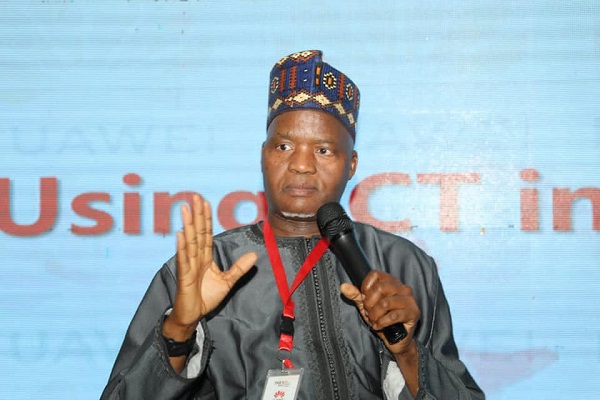
The director-general of the National Information Technology Development Agency (NITDA), Mallam Kashifu Abdullahi has underscored the need for Nigeria to deepen information and communications technologies (ICT) partnerships with her academia, to empower Nigerian students.
Speaking during the Huawei Education Summit 2022 (THES2022) themed “New Approach in Meeting Rising Educational Expectation” in Abuja, he noted that it has become expedient to forge and strengthen linkages between the ICT industry and tertiary institutions due to the benefits.
According to him, as the apex IT regulator in Nigeria under the supervision of the Federal Ministry of Communications and Digital Economy, NITDA is committed to ensuring that efforts in this regard are supported and sustained.
“We cannot go far as a nation if ICT adoption in our tertiary institutions is not systemic and coherent. The world is becoming digital and tertiary institutions are where our leaders of tomorrow come from. Hence, we must do everything possible to empower them,” he maintained.
While referring to available statistics which he noted have shown that about 65 per cent of Nigerians are aged 35 years or younger and are considered highly-skilled, tech-savvy generation of millennials, Abdullahi observed that it is not therefore surprising that the founder of Facebook, Mark Zuckerberg during his visit to Nigeria in 2016, asserted that he was blown away with the talents he saw in the country.
The DG said the development of digital skills for Africans and, particularly, Nigerian students, is significant for the development and industrialisation of the continent, adding that Nigerian students are digital natives in need of an enabling environment.
“This can be seen in the successes recorded by Nigerian students in global competitions, especially the Huawei Global ICT competition series.
“You may recall that in the fourth series, the Nigerian team won the first prize in the regional final in South Africa and third place in the global final, while at the fifth series, three Nigerian teams entered the global final and won the grand prize in the practice competition in both the Network Track and the Cloud Track,” the DG recalled.
Represented by NITDA’s director, information technology infrastructure solutions (ITIS), Dr. Usman Abdullahi, the NITDA boss further affirmed that humans are now living in an ever-evolving digital world where ICT breeds innovation which has made digital skills highly essential for success.
He noted that the importance of ICT informed the identification of the Digital Literacy and Skills pillar of the National Digital Economy Policy and Strategy for a Digital Nigeria (NDEPS, 2020-30), as the policy has an ambitious target of attaining 95 per cent digital literacy and skills by 2030.
“It is plain to see that acquiring digital skills and gaining new qualifications is the key to success in the modern age; whether you are a new entrant looking to climb the career ladder, the founder of a startup, or a senior executive in charge of a large team, failure to keep up with the times could prove disastrous. Regardless of where in the world you find yourself, regardless of the place you start, opportunity can be open for all in the digital economy,” Abdullahi explained.
He enumerated other pillars of NDEPS to include developmental regulation, solid infrastructure, service infrastructure, digital services development & promotion, soft infrastructure, digital society and emerging technologies and indigenous content development & adoption.
“NITDA, as one of the implementing agencies of the ministry, has been carrying out a series of intervention programmes in tertiary institutions. These include the deployment of ICT parks and innovation hubs, hive centres and centres of cyber security research,” he noted.
Abdullahi added that the summit couldn’t have come at a better time, as it will avail participants the opportunity to discuss and share ideas on how best the academia, industry and government can partner towards meeting the expectations of learners, industry and society at large.
He commended and expressed gratitude to Huawei Technologies for its commitment to promoting ICT development in Nigeria.
“Huawei’s effort at digital literacy and skills in the country in some way is to help the agency achieve its mandates. Our presence here shows how committed we are to the realisation of NDEPS’ vision of transforming Nigeria into a leading digital economy, providing quality life and digital economies for all as well as the mission of building a nation where digital innovation and entrepreneurship are used to create value and prosperity for all,” Abdullahi said.
Other stakeholders described the event as key to empowering the teaming Nigerian students with the requisite skills to thrive.
They expressed the hope that it will also give the heads and principals of higher education real-life, globally recognised solutions and standards to propel the Nigerian education sector in meeting the growing expectations and delivering global standards in the quality of teaching and learning experience.
The Huawei Education Summit, according to the organisers, was convened in response to observed trends in the Nigerian higher education sector – increasing relevance of technology in higher education learning and teaching, gender equity and inclusion in higher education, research and innovation in higher education campuses, teaching quality and relevance.


